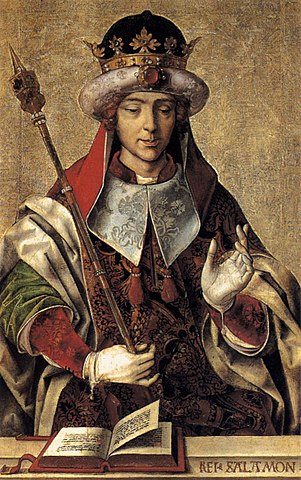Difference between revisions of "Template:Occult.live:Today's featured article"
Occultwiki (talk | contribs) |
Occultwiki (talk | contribs) |
||
| Line 1: | Line 1: | ||
[[File: | [[File:King-Solomon.jpg|250px|left]] | ||
'''[[ | '''[[King Solomon]]''' was, according to the Hebrew [[Bible]] or Old Testament, a fabulously wealthy and wise king of the United Kingdom of Israel who succeeded his father, David. The conventional dates of Solomon's reign are about 970–931 BCE, normally given in alignment with the dates of David's reign. | ||
According to the Talmud, Solomon is one of the 48 Jewish prophets. In the Quran, he is considered to be a major [[Islam]]ic [[prophet]], and Muslims generally refer to him as ''Sulaiman ibn Dawud''. The Hebrew Bible identifies Solomon as the builder of the First Temple in Jerusalem, beginning in the fourth year of his reign using the vast wealth he and his father had accumulated; he dedicated the temple to [[Yahweh]], the God of Israel. Solomon is portrayed as great in wisdom, wealth and power beyond either of the previous kings of the country. | |||
'''([[ | He is the subject of many other later references and legends, most notably in the 1st-century apocryphal work known as the ''[[Testament of Solomon]]''. In the New Testament, he is portrayed as a teacher of wisdom excelled by [[Jesus Christ]], and as arrayed in glory, but excelled by "the lilies of the field." In later years, in mostly non-biblical circles, Solomon also came to be known as a [[magician]] and an [[exorcist]], with numerous amulets and medallion [[sigil|seals]] dating from the Hellenistic period invoking his name. | ||
'''([[King Solomon|Full Article...]])''' | |||
Revision as of 00:05, 13 November 2023
King Solomon was, according to the Hebrew Bible or Old Testament, a fabulously wealthy and wise king of the United Kingdom of Israel who succeeded his father, David. The conventional dates of Solomon's reign are about 970–931 BCE, normally given in alignment with the dates of David's reign.
According to the Talmud, Solomon is one of the 48 Jewish prophets. In the Quran, he is considered to be a major Islamic prophet, and Muslims generally refer to him as Sulaiman ibn Dawud. The Hebrew Bible identifies Solomon as the builder of the First Temple in Jerusalem, beginning in the fourth year of his reign using the vast wealth he and his father had accumulated; he dedicated the temple to Yahweh, the God of Israel. Solomon is portrayed as great in wisdom, wealth and power beyond either of the previous kings of the country.
He is the subject of many other later references and legends, most notably in the 1st-century apocryphal work known as the Testament of Solomon. In the New Testament, he is portrayed as a teacher of wisdom excelled by Jesus Christ, and as arrayed in glory, but excelled by "the lilies of the field." In later years, in mostly non-biblical circles, Solomon also came to be known as a magician and an exorcist, with numerous amulets and medallion seals dating from the Hellenistic period invoking his name.
